
@’s by Dynamite’s CAPTAIN VICTORY Writer
Sterling Gates!!!
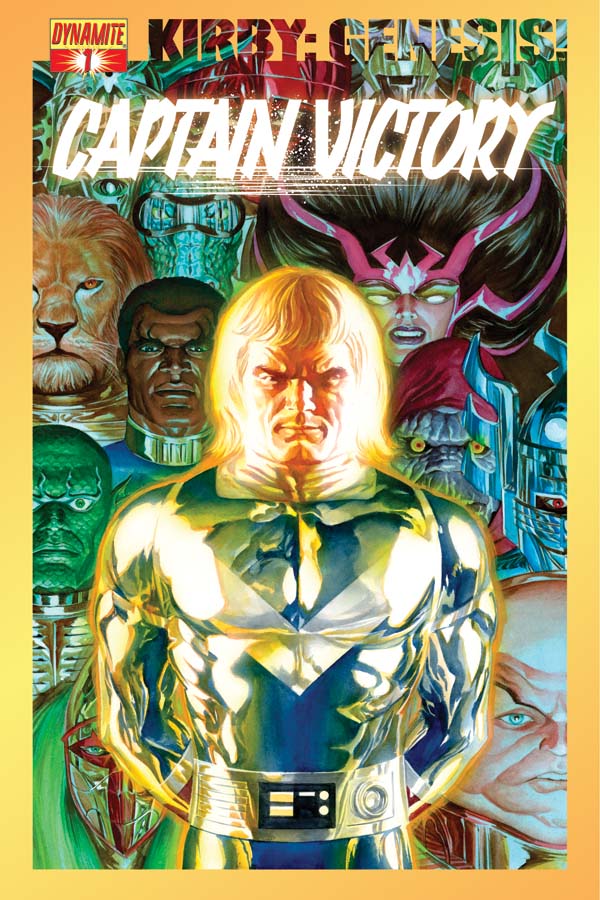 OPTIMOUS DOUCHE (OD): Well, let’s start at the beginning. How did you get onboard with the Genesis initiative at Dynamite?
OPTIMOUS DOUCHE (OD): Well, let’s start at the beginning. How did you get onboard with the Genesis initiative at Dynamite?STERLING GATES (SG): It started with a phone call from Dynamite publisher and editor-in-chief Nick Barrucci. My exclusive contract at DC was up and Nick said he wanted to talk to me about doing some work with Dynamite.
I hadn’t heard about the KIRBY: GENESIS stuff at all, so Nick had to walk me through what Kurt Busiek and Alex Ross were planning. Editor Joe Rybandt sent over the script for GENESIS #1 and Kurt’s Kirby-verse outline a week later, and what I saw got me jazzed.
Just the idea that someone – in this case, Dynamite, Kurt, and Alex – had gone through Jack Kirby’s sketchbooks and collected his unused characters and designs to create a new comic book universe out of it? That was really, really intriguing to me. The list of unused Kirby characters Kurt put together went on forever, and I saw the potential in developing the Kirby-verse.
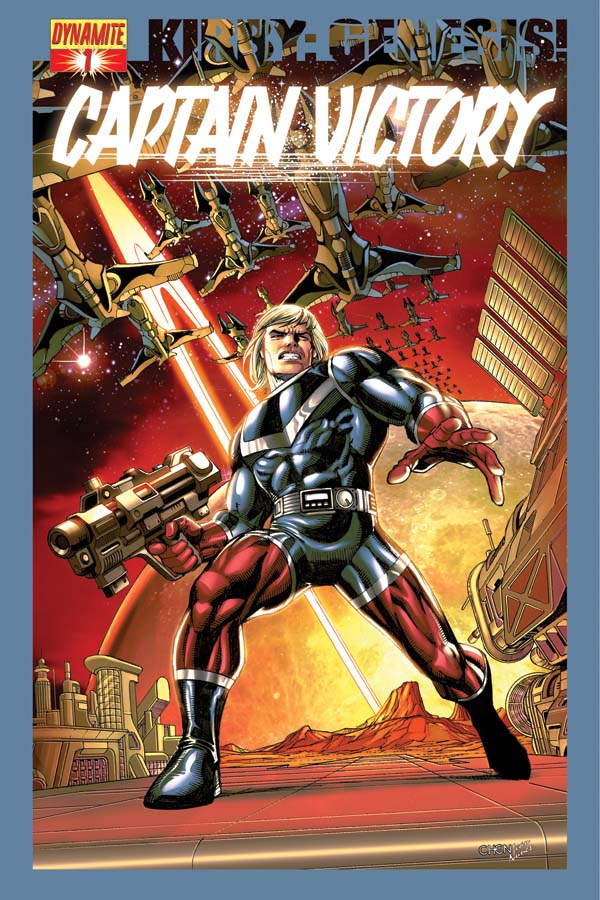 Jack Kirby was one of the most prolific American comic creators of all time. He probably created more in a week than most people create in their lifetimes, and it’s fitting that Dynamite is choosing to honor him with a brand-new comic book universe based on his creations. Looking at this list and looking at the art, there are enough designs to introduce a new Kirby-created comic book character every month for the next 15 years, easy.
Jack Kirby was one of the most prolific American comic creators of all time. He probably created more in a week than most people create in their lifetimes, and it’s fitting that Dynamite is choosing to honor him with a brand-new comic book universe based on his creations. Looking at this list and looking at the art, there are enough designs to introduce a new Kirby-created comic book character every month for the next 15 years, easy.Because of my work on the Superman and Green Lantern universes at DC, Nick and Joe asked me if I’d be interested in focusing on the more science fiction aspect of the Kirby-verse and write CAPTAIN VICTORY. I wasn’t familiar with the 13-issue series Kirby wrote and drew in the 80’s, so after a pretty deep reading of the issues, I wrote a series outline and a character bible. Once we brought on the talented Wagner Reis, we were up and running. Honestly, I’m thrilled to be a part of the Genesis wave, carrying Captain Victory and the Galactic Rangers’ story forward.
OD: Can you describe the creative process working with the great Alex Ross? A little detail on the back and forth?
SG: Well, Alex was very receptive to the ideas I presented in my series outline. Kurt had a couple notes, mostly involving characters I wanted to use, but for the most part they seemed happy with what I’d set up. The month-to-month process is pretty simple: I turn in a script, Alex gives notes, my editors have their say, and then it gets drawn. It’s been an incredibly smooth creative process so far.
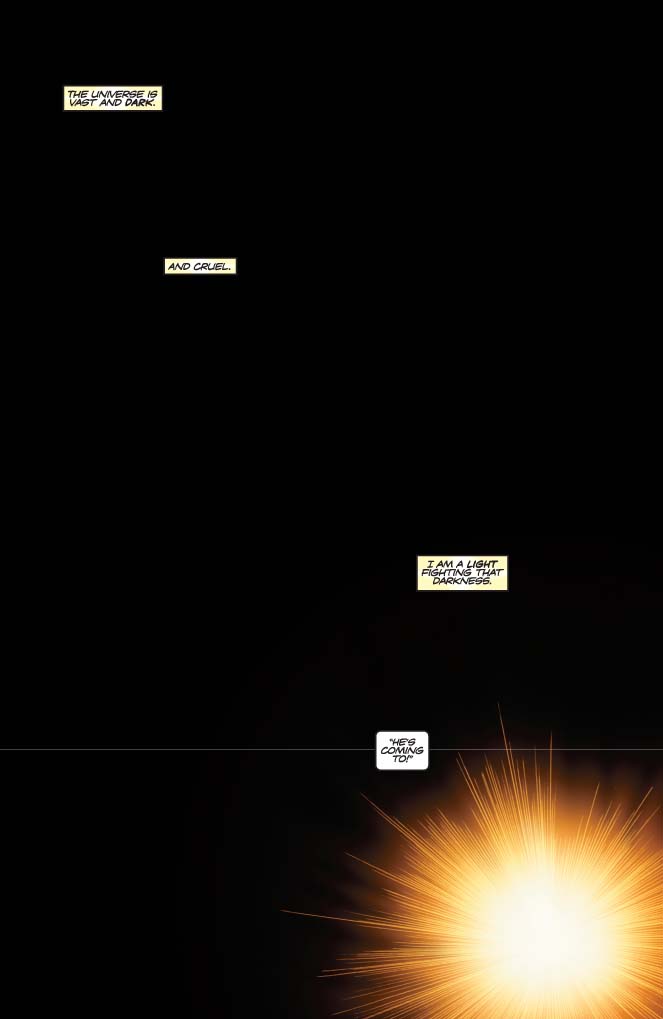 OD: When dealing with the work of God Kirby, how did you and Alex decide what to keep from the original series and what would be updated?
OD: When dealing with the work of God Kirby, how did you and Alex decide what to keep from the original series and what would be updated? SG: Well, my takes on the characters aren’t too far off from what Kirby wrote in his initial series. The only thing I’ve tried to do is add more to their backstories and humanize them a little bit. Kirby was great with the high concepts (and there are a LOT in Captain Victory), but he didn’t really do a lot to flesh out the cast of the book. Issue two revolves around the lion-man, Tarin, and issue three spotlights Victory’s C.O., Major Klavus. I wanted to explore who these characters were and why they follow Captain Victory. I was a huge fan of ABC’s “Lost,” where the b-plot flashbacks informed the a-plot story, so I structured each issue in the first arc that way. Captain Victory is a fairly controversial figure within the Galactic Rangers, and everyone who follows him is devoted to him for a reason. By the end of the first big arc, you should have a pretty definitive idea about each character in the cast and why they’re so anxious to follow Victory and fight Victory’s grandfather, Blackmass.
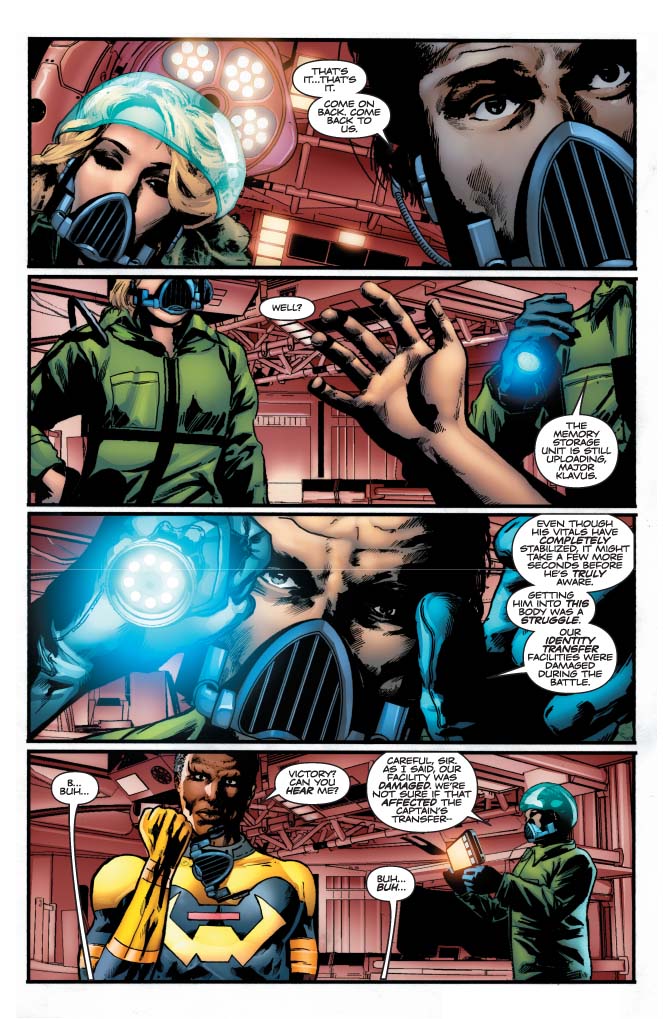 OD: Did you kill any sacred cows?
OD: Did you kill any sacred cows? SG: Hmm…nope! Next question! [laughs]
OD: Anything that absolutely could not be changed? Can old fans expect to see a lot of holdovers from the original material?
SG: Well, like I said, we’re staying pretty faithful to what Kirby created, just dusting off the characters and concepts for a modern audience. I am adding a female Ranger towards the end of the first arc, though, in part because I was worried the book was too masculine and because I didn’t feel like we were getting a true variety of characters and voices within the Rangers. Kirby created one female crewmember in the very last issue of his Victory work, so I’m putting her on the bridge. The bigger the cast, the more story potential.
OD: How is dealing with a fresh start series like VICTORY different from your past i- continuity work over at DC on GREEN LANTERN, SUPERGIRL, and FLASHPOINT: KID FLASH LOST?
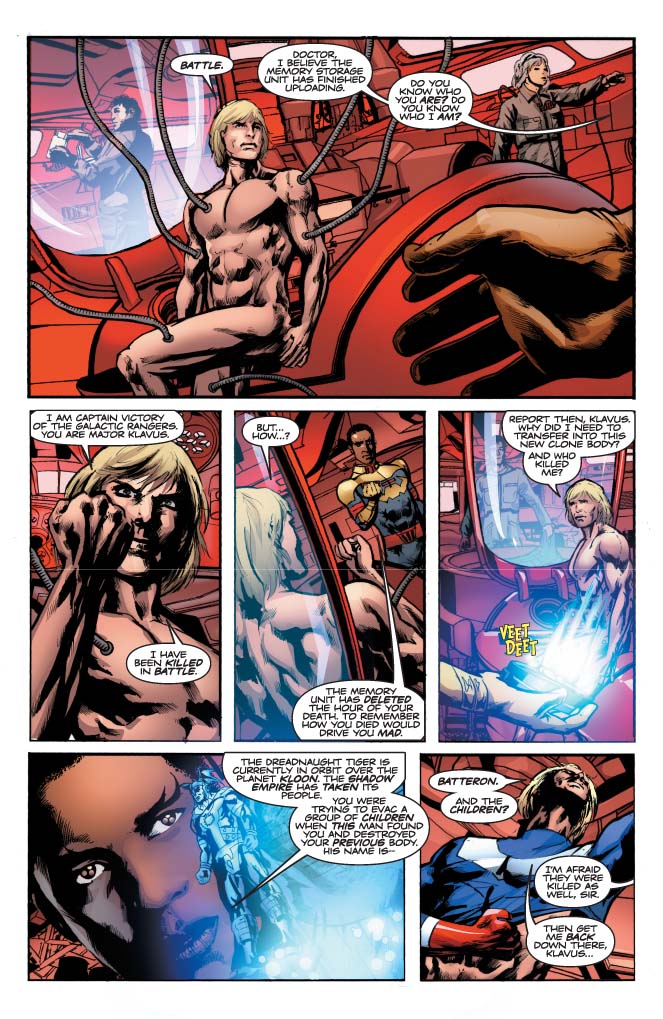 SG: Well, I found the DC work to be more continuity-based because you’re servicing so many other things with your stories. I learned to tell character-centric stories within the framework of the bigger picture. For example, I wrote SUPERGIRL for the two plus years the character was deeply tied into the “New Krypton” mega-arc. James Robinson, Greg Rucka and I (as well as Geoff Johns in the beginning) directed the flow of that story, but it got very tricky figuring out how to tell one-off stories before we were in the next crossover. I had to find a way to keep the sub-plots going even during issues that had nothing to do with my Earth-bound cast members. It was sort of a crash course in crossover writing.
SG: Well, I found the DC work to be more continuity-based because you’re servicing so many other things with your stories. I learned to tell character-centric stories within the framework of the bigger picture. For example, I wrote SUPERGIRL for the two plus years the character was deeply tied into the “New Krypton” mega-arc. James Robinson, Greg Rucka and I (as well as Geoff Johns in the beginning) directed the flow of that story, but it got very tricky figuring out how to tell one-off stories before we were in the next crossover. I had to find a way to keep the sub-plots going even during issues that had nothing to do with my Earth-bound cast members. It was sort of a crash course in crossover writing.Even FLASHPOINT: KID FLASH LOST had to service the bigger story while still telling a great Bart Allen tale. That was actually an easier crossover assignment, because I didn’t have to make it directly tie-in, so I could just tell a Kid Flash story. Naturally, I put him up against my favorite DCU villain, Brainiac, because I’d always wanted to read Bart Allen versus Brainiac.
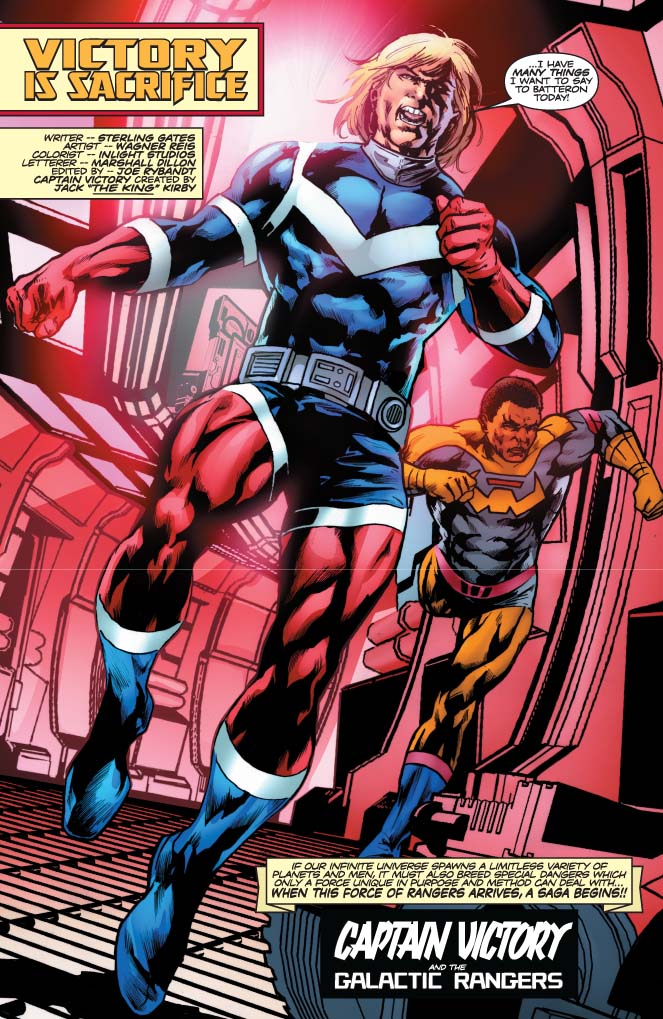 As for CAPTAIN VICTORY, Dynamite has been very open and willing to let me tell whatever story I want to tell with these characters. Following on an idea from Alex, I started issue one with Victory waking up in his new replacement body, and we kept the reader in Victory’s POV for a few pages. That way, you’re waking up into this world alongside Victory, and as his memory download continues to integrate in his head, we’re seeing his flashbacks to the earliest parts of his life. I didn’t have to worry about making sure a scene fits between the panels of pages 22 and 23 of someone else’s comic. It’s liberating in a way, but it can also be daunting. If it turns into a bad story, it’s no one’s fault but my own. So I’ve got to make sure these issues are the best they can possibly be.
As for CAPTAIN VICTORY, Dynamite has been very open and willing to let me tell whatever story I want to tell with these characters. Following on an idea from Alex, I started issue one with Victory waking up in his new replacement body, and we kept the reader in Victory’s POV for a few pages. That way, you’re waking up into this world alongside Victory, and as his memory download continues to integrate in his head, we’re seeing his flashbacks to the earliest parts of his life. I didn’t have to worry about making sure a scene fits between the panels of pages 22 and 23 of someone else’s comic. It’s liberating in a way, but it can also be daunting. If it turns into a bad story, it’s no one’s fault but my own. So I’ve got to make sure these issues are the best they can possibly be.OD: This is a personal question: I heard your big break into comics came by sharing some ideas with Geoff Johns at lunch somewhere. Any validity to this wild internet rumor?
SG: Sort of. I worked as Geoff Johns’ assistant for four years, so that could be where that started. I moved to LA after I graduated college because I wanted to write for television. Through a very, very long chain of events, Geoff helped me land my first Hollywood job as the writer’s room P.A. on BLADE: THE SERIES. When BLADE was canceled (if only we’d had season two--we had SO MANY great ideas for it!), Geoff hired me to be his personal assistant. I worked for him for a year, writing television spec scripts in my off time, before I even let it slip that I was interested in writing comics. I waited a LONG time to bring it up, because I didn’t want to bother one of my favorite comic writers – not to mention my BOSS – with my wanting to write comics.
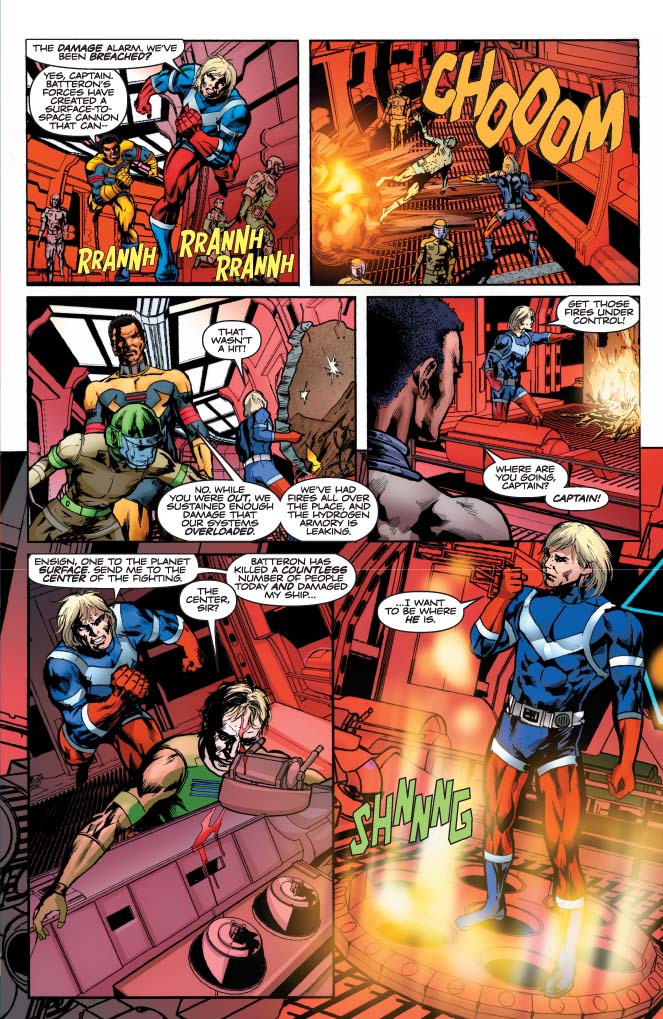 My parents owned a comic store when I was a kid, so I’d grown up surrounded by comic books. I’d written and drawn a bunch of self-published comics in college, stuff that was probably okay, but nothing I’d want anyone to see now. There are copies of that stuff floating around Oklahoma somewhere, I bet. Geoff and I started talking about the differences in writing for screen versus for comics, and after a long conversation he agreed to teach me about comic writing, like an apprenticeship. I wrote a LOT of spec comic book pitches and scripts before he thought they were good enough to even mention to an editor. He introduced me to his editor on GREEN LANTERN, Eddie Berganza, and Eddie agreed to read some of my pitches. Eventually, Geoff helped me sell the story “Fear is a Baby’s Cry,” and my DC career began. I owe my career to Geoff in every way possible, and I doubt I’ll ever be able to thank him enough.
My parents owned a comic store when I was a kid, so I’d grown up surrounded by comic books. I’d written and drawn a bunch of self-published comics in college, stuff that was probably okay, but nothing I’d want anyone to see now. There are copies of that stuff floating around Oklahoma somewhere, I bet. Geoff and I started talking about the differences in writing for screen versus for comics, and after a long conversation he agreed to teach me about comic writing, like an apprenticeship. I wrote a LOT of spec comic book pitches and scripts before he thought they were good enough to even mention to an editor. He introduced me to his editor on GREEN LANTERN, Eddie Berganza, and Eddie agreed to read some of my pitches. Eventually, Geoff helped me sell the story “Fear is a Baby’s Cry,” and my DC career began. I owe my career to Geoff in every way possible, and I doubt I’ll ever be able to thank him enough.OD: You stories seem to imbibe huge chunks of sci-fi. What are some of your influences?
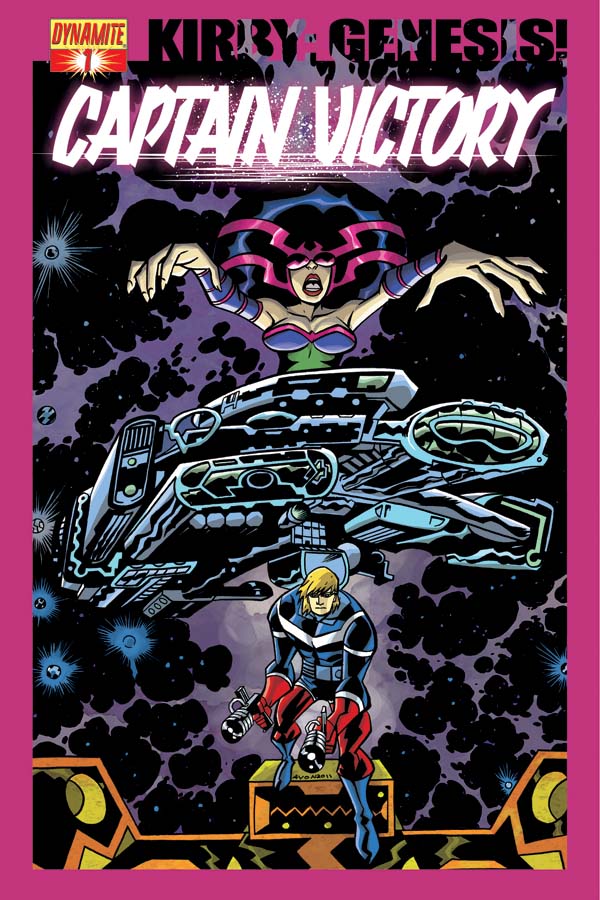 SG: Oh, geez. My influences are probably the same things everyone my age would list, and probably a little all over the place. STAR WARS, for sure. THE MATRIX movies were big for me. DOCTOR WHO. JURASSIC PARK, ALIENS, TERMINATOR 2, PREDATOR 1 and 2, the A NIGHTMARE ON ELM STREET series. QUANTUM LEAP, the FLASH TV show. Stephen King novels. Tim Burton’s BATMAN movie. Robert Jordan’s WHEEL OF TIME series. I was a huge horror movie fan when I was a kid. My favorite movie when I was 7 was the MONSTER SQUAD. ALIENS was my favorite sci-fi movie when I was a teenager, so I got really into all the expanded universe Aliens stuff, like Steve Perry’s ALIENS novels and Dark Horse’s ALIENS comics. I was probably the only kid I knew who had all the Aliens magazines in the early 90’s and an almost complete set of those Aliens toys (btw, how weird is it that they made TOYS out of the Aliens series?). STAR TREK: TNG. MORTAL KOMBAT. A lot of video games, too. Link to the Past, FINAL FANTASY 6 - 9. I was obsessed with Shakespeare and Alfred Hitchcock movies and comic books as a teen.
SG: Oh, geez. My influences are probably the same things everyone my age would list, and probably a little all over the place. STAR WARS, for sure. THE MATRIX movies were big for me. DOCTOR WHO. JURASSIC PARK, ALIENS, TERMINATOR 2, PREDATOR 1 and 2, the A NIGHTMARE ON ELM STREET series. QUANTUM LEAP, the FLASH TV show. Stephen King novels. Tim Burton’s BATMAN movie. Robert Jordan’s WHEEL OF TIME series. I was a huge horror movie fan when I was a kid. My favorite movie when I was 7 was the MONSTER SQUAD. ALIENS was my favorite sci-fi movie when I was a teenager, so I got really into all the expanded universe Aliens stuff, like Steve Perry’s ALIENS novels and Dark Horse’s ALIENS comics. I was probably the only kid I knew who had all the Aliens magazines in the early 90’s and an almost complete set of those Aliens toys (btw, how weird is it that they made TOYS out of the Aliens series?). STAR TREK: TNG. MORTAL KOMBAT. A lot of video games, too. Link to the Past, FINAL FANTASY 6 - 9. I was obsessed with Shakespeare and Alfred Hitchcock movies and comic books as a teen.Since they ran a comic shop, Mom and Dad encouraged my obsession with pop culture, comic books, science fiction, horror, and fantasy novels. My dad took me to see TERMINATOR 2 opening weekend, my mom took me to see DARKMAN opening day. I might not’ve been the most popular kid in middle school, but I knew my pop culture.
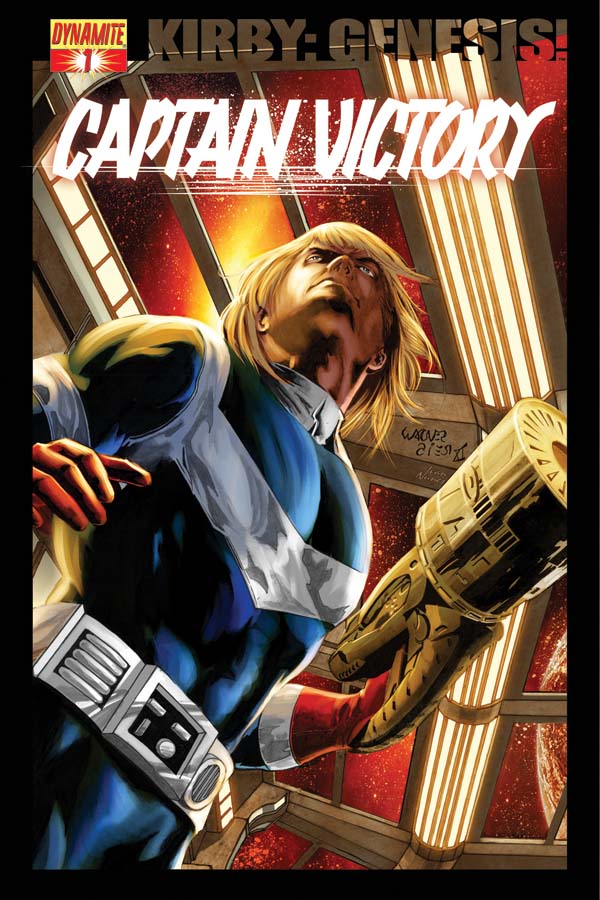 OD: Full disclosure here: I’ve had no contact with the VICTORY source material. One of the things I loved about the book was the surprise ending on Captain Victory’s lineage – essentially being the “black sheep” good guy in a very bad family. Why else would new readers like this book?
OD: Full disclosure here: I’ve had no contact with the VICTORY source material. One of the things I loved about the book was the surprise ending on Captain Victory’s lineage – essentially being the “black sheep” good guy in a very bad family. Why else would new readers like this book? SG: Well, it’s a big sweeping science fiction story, using characters and concepts created by Jack “The King” Kirby. I like to compare it to someone discovering a bunch of unrecorded music from your favorite band, and then seeing a group reinterpret it as they record it. We’re taking Kirby’s unused characters and trying to build an all-new, all-different comic universe out of them.
As a comic fan, I think that’s just a really, really cool idea, and I hope people check it out!
OD: Check out CAPTAIN VICTORY from Dynamite Entertainment this month!
Optimous has successfully blackmailed fellow @$$Hole BottleImp into being his artist on Average Joe. Look for Imp's forced labor on Optimous brain child in mid-2012 from COM.X. Friend Optimous on FaceBook to get Average Joe updates and because ceiling cat says it's the right thing to do.
Proofs, co-edits & common sense provided by Sleazy G
